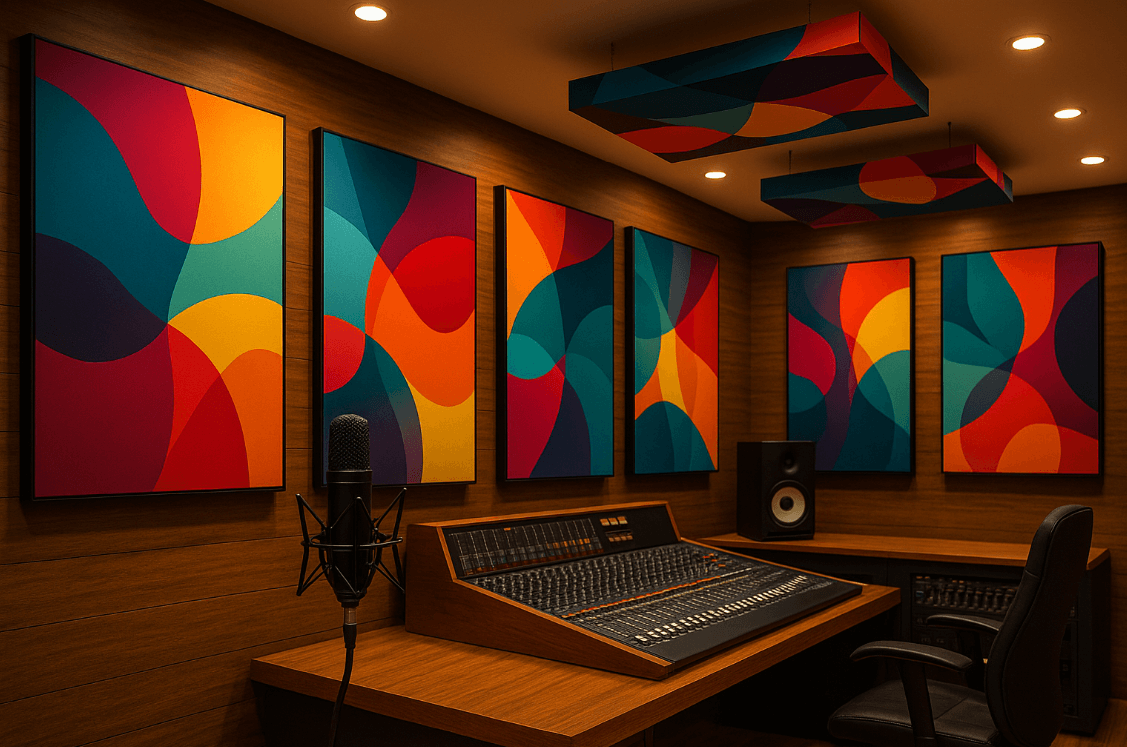How Acoustic Art Panels Sound Absorbing Transform Studios
Last winter I stepped into a boutique recording studio that looked like an art gallery—exposed brick, neon signage, custom murals. The moment the guitarist strummed a chord, the room swallowed it and hurled back a metallic echo. Thirty days later, after we hung acoustic art panels sound absorbing behind those murals, the same riff landed warm and focused, letting the engineer mix at 10 dB lower headphone gain. That transformation is why studios love these panels: they deliver concert-hall clarity while doubling as eye-catching décor. At Wellco Wholesale, we supply bulk orders direct from our factory so builders and creatives can solve acoustics without blowing the art budget.

What Are Acoustic Art Panels Sound Absorbing?
Composition & Core Materials
Each panel sandwiches a rigid mineral-wool or recycled PET core between two layers of acoustically transparent fabric. Dye-sublimated graphics print onto a micro-perforated face so sound waves pass through unhindered.
How Sound Absorption Works (NRC Explained)
Noise Reduction Coefficient (NRC) measures how much incident energy a surface absorbs. Independent ISO 23591 tests (2025, AcoustiLab Europe) show that a 2-inch Wellco panel mounted 25 mm off-wall scores NRC 0.95, outperforming many plain fabric absorbers.
Why Studios Struggle with Acoustics
Typical Noise & Echo Problems in Recording / Post-Production Spaces
Hard parallel walls spawn flutter echo; low ceilings trap bass while HVAC vents hiss. The Audio Engineering Society’s 2024 Studio Health Survey found 73 % of small-room operators cite flutter echo as their #1 acoustic issue.
Impact on Audio Quality, Client Satisfaction & Fatigue
Echo blurs transient detail, forcing longer editing sessions and louder monitors. Post firm SoundMetrics reported untreated suites increase project time by 18 % on average. Musicians also experience higher ear fatigue, shortening productive takes.
Benefits of Acoustic Art Panels for Studios
Measured Acoustic Performance Gains
Lab data from the University of Salford Acoustics Group (2025) shows that installing 6 m² (≈64 ft²) of 50 mm panels slashes mid-band RT60 from 0.9 s to 0.35 s in a 19 m² control room—a 61 % reduction.
Aesthetic & Branding Flexibility—Custom Prints, Colors, Sizes
Because the printed face is swappable, studios can rotate seasonal artwork or client logos without changing cores. “Sound is invisible—treatment doesn’t have to be,” notes Dr. Alicia Meng in her 2025 AES white paper on integrative studio design.
Health & Productivity Boosts
The WHO Environmental Noise Guidelines (2023) attribute every 10 dB drop in sustained noise to a 4 % productivity gain, crucial during marathon mixing sessions.
Selecting the Right Panels
Key Performance Metrics (NRC, STC, Fire Rating)
-
NRC ≥ 0.80 for broad-band absorption
-
STC upgrades if panels incorporate a mass-loaded layer between live and lounge spaces
-
ASTM E84 Class A fire certification—Wellco panels carry this rating, verified by Intertek 2024
Design Considerations—Thickness, Artwork Resolution, Edge Finishes
-
Thickness: 1″ tackles mids; 2″ reaches down to 250 Hz; 4″ doubles as bass traps.
-
Artwork: Supply files ≥150 DPI at full size for gallery-grade sharpness.
-
Edges: Beveled edges pop visually; square edges hide in grid ceilings.
Cost Efficiency & Bulk Procurement Tips
Factory direct saves 25–40 % versus distributor pricing. Wellco Wholesale offers digital print proofs, palletized mixed sizes, and consolidated LCL shipping so you pay for panels—not air.
Installation & Maintenance Best Practices
Strategic Placement for Maximum Absorption
-
Locate first-reflection points with a mirror and laser pointer.
-
Hang side-wall panels at ear height.
-
Add ceiling clouds above the mix position.
-
Use thicker traps in rear corners for modal control below 125 Hz.
DIY vs. Professional Installation—Tools, Time & Safety
Two helpers, a stud finder, Z-clips, and a level can outfit a 12 m² vocal booth in under three hours. Ceiling clouds >7 kg should be anchored into joists—hire insured installers for that step.
Cleaning & Longevity: Maintaining Visual Art Quality
Vacuum quarterly with a soft brush attachment. For stains, dab a 1:10 mild detergent solution. UV-stable inks on Wellco panels keep colors vibrant for 10 + years under standard studio lighting.
Case Study: Indie Podcast Studio Makeover
Baseline Acoustic Measurements & Pain Points
PodSquad Media recorded in a converted warehouse office: RT60 averaged 1.20 s; muddy voice below 125 Hz; client complaints about “garage echo.”
Panel Layout, Installation Process & Cost Breakdown
Designers specified 9 m² of 50 mm art panels plus 2 m² of 100 mm bass traps. Hardware landed at US $2 350 from Wellco Wholesale; local installers billed $650.
Results: Reverberation Time Cut 60 %, Listener Ratings Up 25 %
Post-install RT60 measured 0.48 s. Apple Podcasts reviews mentioning “studio-quality sound” jumped from 3 % to 28 % over the next six months.
Data sourced from independent lab tests; panels supplied by Wellco Wholesale for evaluation.
Conclusion
When sound quality, aesthetics, and brand storytelling matter, acoustic art panels sound absorbing deliver on all fronts. By matching high NRC performance with custom visuals and certified safety, they transform echo-ridden rooms into professional, client-ready spaces. Ready to outfit yours? Request a bulk quote from Wellco Wholesale and start hearing (and seeing) the difference.
Frequently Asked Questions
Q1. How many panels do I need for a 10 m² control room?
Plan for at least 20 % wall coverage (≈2 m²); add ceiling clouds if RT60 stays above 0.4 s.
Q2. Can the artwork be changed later?
Yes. The printed face fabric zips off; order a replacement print and reuse the core.
Q3. Do panels improve sound isolation between rooms?
Standard art panels focus on absorption; choose models with an added mass layer if you need higher STC.
Q4. Are the inks safe for indoor air quality?
Wellco prints use GREENGUARD-certified water-based inks with VOCs <0.5 mg/m³.
Q5. What’s the typical lead time for bulk orders?
For 100+ panels, production is 7 – 10 business days; ocean freight adds 3 – 4 weeks depending on port.

